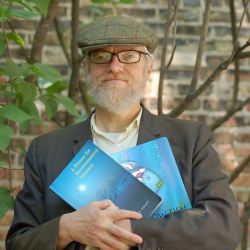Last week, watching kids frolic at a playground from the window of his home office, Liam Heneghan tweeted:
Liam Heneghan@DublinSoil: If our kids were environmentally literate they would curl up in a ball, sob, and never leave the tree house. 10:31 AM-24 Jul 2014
While environmental literature began surfacing first in the 1960s and again the ’80s, titles are becoming more abundant under topics such as climate change. They don’t, however, “offer the subtlety and beauty” found in those written for the purpose of story.
What is happening environmentally is “hugely and profoundly depressing,” Heneghan says. “It’s not going to be productive to depress children with the full magnitude of the disasters we have inflicted on the world.”
Heneghan, born in Dublin, is much a child himself. He has a penchant for tooting on his tin whistle in a local cemetery, “playing for the dead,” and using his beard as a pencil holder in the classroom. He’s penned essays about the ecological lessons of Winnie-the-Pooh and killing animals in the name of science. He is currently authoring a book on environmental education for children, called Beasts at Bedtime.
Oddly creative, Heneghan’s studies range from things “unseen” such as soil mites, to better ways of disposing of human poop than mingling it with water systems. “The bear, you might recall, shits on the forest floor,” he says.
In his seminar, Heneghan uses long beloved children’s books such asCharlotte’s Web, The Lion, The Witch and the Wardrobe, and Where the Wild Things Are as foundations for students in both environmental studies and in the School of Education.
Just as important as the content is the presentation, he says. “The last thing you want to do is turn something precious and carefree into a pedagogical exercise. The idea would not be, ‘Let’s close the book and talk about nutrient cycling.’ We can’t be profoundly gloomy.”
Instead, Heneghan says we must help children fall in love with nature. It helps, he says, to find a way back in our own minds to the gorgeous habitats our imaginations invented as youngsters. Then simply pass that appreciation on to children through play and hikes and all things nature – and a classic story or two.
Timothy Morton, an environmental philosopher who teaches at Rice University and author of Ecology Without Nature says, “We need more Liams,” as society is going through a massive shift in how humans relate to non-humans, from climate to microbes. “Some deep thinking is needed to get us over the speed bumps,” Morton says.
While pointing out that he’s not the first person to realize the environmental themes running through early children’s books, Heneghan says that there’s increasing interest in developing environmental curriculum for young children. The right books, he adds, are right under our noses.
Here are some of his favorites:
· The Hobbit
· The Rainbow Fish
· The Giving Tree
· Corduroy
· Bridge to Terabithia
· Charlotte’s Web
· Grimm’s Fairy Tales
· Where the Wild Things Are
· The Giver
· The Tale of Peter Rabbit
Lori Rotenberk is a Chicago-based journalist whose work has appeared in the New York Times, The Boston Globe, Chicago Wilderness Magazine, and the Chicago Sun-Times. She is also also wild about nature. Follow her on Twitter.
Here's what the environmental philosopher Tim Morton (whose books are profiled elsewhere in this blog), says about Liam...
FRIDAY, AUGUST 8, 2014
We Need More Liams Good for Liam Heneghan.
When interviewed I also said that I was sure that Liam wasn't teaching these sorts of books because they were simplistic. Rather, he's teaching them because unlike self-censored “adult” literature, they contain all kinds of ecological awareness. That kind of awareness translates into sentimental kitsch in most “adult” eyes.
Yet in an ecological age, when there is no one proper scale from which to examine or judge things, all art falls into the uncanny valley of kitsch...as I'm arguing in Dark Ecology.
Posted by Timothy Morton at 1:35 PM
http://ecologywithoutnature.blogspot.com/2014/08/we-need-more-liams.html?
Liam Heneghan blogs at: 10thingswrongwithenvironmentalthought.blogspot.com/

 RSS Feed
RSS Feed